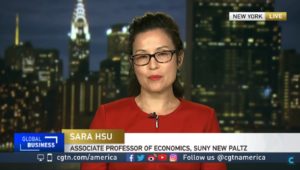
China’s close to one trillion US dollar investment program One Belt, One Road (OBOR) is facing serious pitfalls that could stop it from succeeding, writes financial analyst Sara Hsu in the Huffington Post. Insufficient due diligence is just one of a range of potential barriers, she writes.
Sara Hsu:
The question, though, is if it will succeed. There appears to be insufficient due diligence in some cases, which carries political and financial risks. For example, work on the Colombo port project in Sri Lanka and a high-speed rail plan in Indonesia stalled due to local opposition. In other areas, like Gwadar in Pakistan, security is a major concern.
Projects funded by the Asian Infrastructure Investment Bank are more likely to be carefully weighed in terms of risk. By contrast, projects financed by the China Development Bank or the Export and Import Bank of China may undergo standard examination but, as part of an array of projects on the table, may be short-changed in full analysis and oversight.
AIIB has provided $1.73 billion for nine Belt and Road projects. The overall figure for projects in the planning or implementation stages is $900 billion. The vast majority of funding for Belt and Road projects comes from the Export and Import Bank of China, China Development Bank and China’s commercial banks. China’s policy banks are overbooked: in 2015 alone, the China Development Bank said it had reserved $890 billion for over 900 projects. What is more, the Export-Import Bank of China stated at the beginning of 2016 that it had funded over 1,000 projects. How can these large development banks plan and oversee that many projects?
Sara Hsu is a speaker at the China Speakers Bureau. Do you need her at your meeting or conference? Do get in touch or fill in our speakers’ request form.
Are you looking for more experts on China’s outbound investments at the China Speakers Bureau? Do check out this list.
